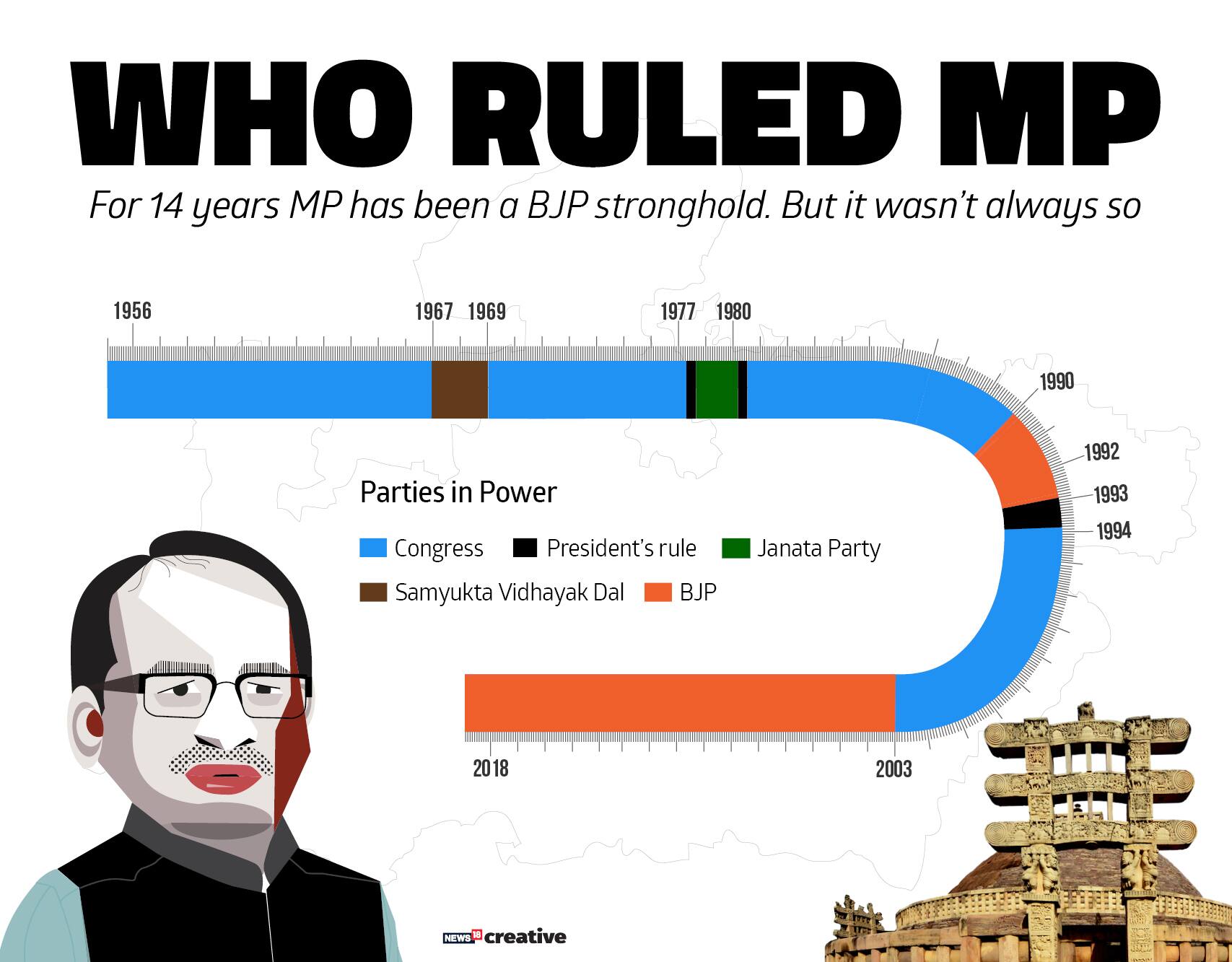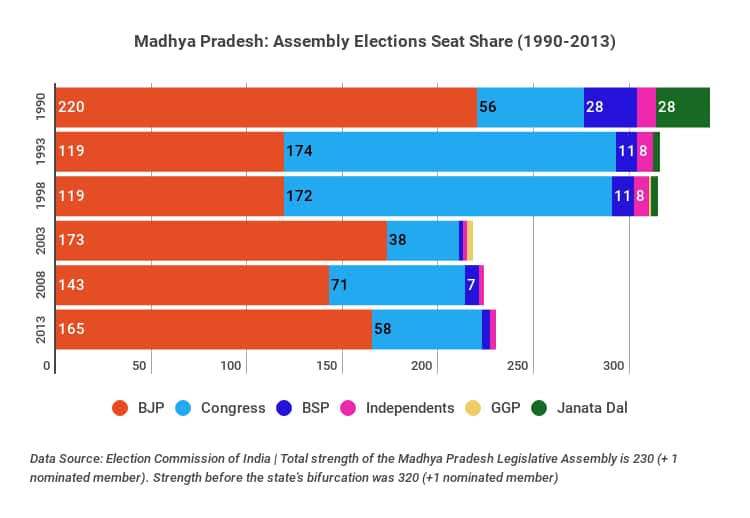



Madhya Pradesh is gearing up to elect a new Assembly in November. It is expected to be a heated contest between the incumbent Bharatiya Janata Party (BJP) and the Indian National Congress.
The BJP government led by Chief Minister Shivraj Singh Chouhan is facing a tide of anti-incumbency after being in power for 15 years. Chouhan has been at the helm of affairs for 13 of those years.
The state, called the ‘Heart of Hindustan’ in its tourism campaign, will vote in a single phase election on November 28. The tenure of the current Assembly is slated to end on January 7, 2019.
The counting will take place on December 11 along with that for Chhattisgarh, Mizoram, Rajasthan and Telangana.
Also read: All you need to know about upcoming state elections in 5 states
Binary politics
Except for two brief Janata Party and Samyukta Vidhayak Dal governments, elections in Madhya Pradesh have largely been a binary contest between the BJP and the Congress.
The BJP has been central in the state’s politics ever since it first came to power in 1990. MP was one of the first states where BJP came to power. The saffron party’s grip over the state has only tightened over time.
The Congress governed Madhya Pradesh from November 1, 1956, when the state was formed, to 1967.
After a Samyukta Vidhayak Dal government that lasted around a year and a half, Congress regained power and continued till 1977.

The state’s sixth Assembly witnessed three chief ministers from the Janata Party in less than three years (1977-1980).
Between 1980 and 1990, Congress’ Arjun Singh and Motilal Vohra became the chief minister twice each. Digvijaya Singh then served as the chief minister for two terms between 1993 and 2003. Critics have often attributed BJP’s subsequent success in the state to a “forgettable” tenure by Singh. Congress has remained out of power in the state since 2003.
Voting pattern
In the last three Assembly polls, BJP has commanded a vote share higher than the Congress.
In 2013, BJP had a vote share of 44.88 percent across the state while the Congress came second with 36.38 percent of the votes. BSP and the SP picked up 6.29 percent and 1.20 percent of the votes respectively. GGP polled 5.38 percent of the votes. Independent candidates picked up a total of 1.90 percent of the votes across the state. None of the Above (NOTA) option, which was introduced ahead of the polls was opted by 1.90 percent voters in the state.

The vote share translated into BJP winning 165 seats while the Congress bagged 58 seats. BSP had won four seats while independent candidates clinched three seats.
BJP’s vote share significantly rose from what was 37.64 percent in 2008. In the 2008 polls, a swing of votes had benefitted the Congress, which although finished second, garnered a vote share of 32.39 percent.
The 2008 polls were the first for BJP under Chouhan’s stewardship.
The same year, the BSP registered its best performance in recent times with a vote share of just under 9 percent. SP and GGP picked up around 2 percent and 1.69 percent of the votes respectively. Independent candidates together polled 8.23 percent of the votes, across the states.
The numbers suggest that in the 2008 assembly polls, BSP, SP, GGP and the independent candidates had gained at the expense of both the BJP and the Congress.
Five years earlier, in the 2003 assembly polls, the performance of political parties was similar to what was witnessed in 2013. BJP, riding on an anti-incumbency wave against then Congress chief minister Digvijaya Singh, received a 42.50 percent votes share. Congress managed to secure 31.61 percent votes. This was followed by 7.26 percent votes for the BSP and 3.71 percent votes for the SP.
The GGP, having contested 61 seats, managed to receive little over 7 percent of the votes. Independent candidates won a total of 7.70 percent votes across the states.

With the majority-mark in the 230 member assembly being 116, Congress would require a vote swing of at least five percent in their favour to win the election, a report by NDTV suggests.
Mayawati-led BSP’s decision to contest separately may also impact the Congress. The BSP has an influence in around 41 seats of the state, including a very strong influence in at least 13 seats in the Gwalior-Chambal region. The region has also attained importance as the epicentre of the Scheduled Castes/Scheduled Tribe (SC/ST) protests in the state.
Opinion polls have predicted a tough battle between the Congress and the BJP. Some surveys indicate that other parties, including the BSP could also clinch few seats and play a possible ‘king maker’.
Assembly Elections 2018: Read the latest news, views and analysis here
Discover the latest Business News, Sensex, and Nifty updates. Obtain Personal Finance insights, tax queries, and expert opinions on Moneycontrol or download the Moneycontrol App to stay updated!